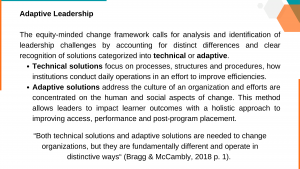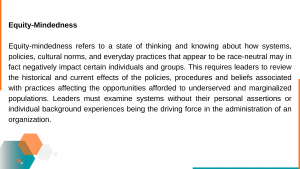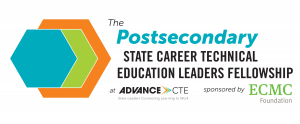This is the third blog in a series of four blogs about the Postsecondary State Career Technical Education Leaders Fellowship at Advance CTE – Sponsored by ECMC Foundation (Fellowship) and provides Career Technical Education (CTE) leaders with a framework by which to develop equitable CTE ecosystems, a foundational approach to ensuring all learners have access to high-quality programs aligned to in-demand high-wage occupations.
Overview
The Postsecondary State Career Technical Education Leaders Fellowship at Advance CTE – Sponsored by ECMC Foundation is anchored in the construct of “Equity-Minded Change Leadership” which posits that in order to transform education systems and engage the operations of and organizational structure of education institutions, a lens of “equity-mindedness” has to be clearly defined and used to evaluate learner outcomes. To clearly determine a challenge, adaptive leadership is necessary. The combination of the adaptive leadership theory and the concept of equity-mindedness is the foundation of equity-minded change leadership. Advance CTE chose this framework of equity-minded change leadership because it can support CTE leaders in fostering change and addressing the effects of inequitable systems on learners who have been underserved by education institutions.


Defining the Challenge
In order to transform or mitigate the effects of an inequitable system, the problem has to be clearly defined and categorized to determine the approach leaders should take and which solutions to apply to enhance learner success. “Adaptive challenges linked to differences in how students experience and benefit from education, systematically advantaging some while disadvantaging others, must be recognized and addressed to change education in ways that reduce and eventually resolve systemic equity gaps”.1 Equity-minded change leadership. Seattle, WA: Bragg & Associates, Inc. Retrieved on April, 12, 2018.[/efn-note] As part of a mandatory real-world research project, each fellow identified a challenge, collected data to describe the scope of the challenge, applied a solution to the challenge, reported on the impact of the intervention, as well as offered recommendations using the adaptive change leadership theory.
A few examples of research topics explored include:
- Advancing Equitable Access to CTE Programming in Illinois Correctional Facilities
- The Impact of House Bill 444 on Career Technical and Agriculture Education Enrollment at Technical College System of Georgia Institutions
- Eliminating the Educational Assessment Score Requirement for Enrollment in Postsecondary Education CTE Programs in the Texas Department of Criminal Justice
- Exploring Equity Gaps and Achievement in the Agriculture Cluster at Rural Community Colleges in Northern California
- Increasing the retention rate among African American Males at Greenville Technical College
Analyzing the Gap
How challenges are initially framed are important and essential to applying the appropriate solution to a problem. Equity-mindedness takes into account the current systems, policies, cultural norms and everyday practices being applied in an education institution or agency and evaluates the impact, intentional or unintentional, on individuals or groups. A starting point for the Fellows was to disaggregate data by the special populations and subgroups identified in the Carl D. Perkins Career and Technical Education Act (Perkins V) and analyze learner outcomes for a subset of this group. This analysis revealed gaps in access and outcomes, which were then mapped to root causes that likely require systemic interventions and remedies.
Building Solutions
Equity-minded change leadership offers state leaders an evidence-based approach to deliberately and systematically evaluate impact for learners. In doing so, it holds the potential to be a transformational lever to achieve, fully, the aspirations of CTE Without Limits. During the Fellowship, Fellows applied this framework to their real-world projects with much success. Fellows evaluated equitable access to CTE programming for justice-involved learners, Black males in South Carolina’s technical college system and women in rural communities, among others. CTE has always been a system that was required to be responsive to the needs of industry. As state leaders strive to build high-quality CTE systems, they must also be responsive to the needs of our nation’s increasingly diverse learner population.
Blog 4: Advancing Equity in CTE: Administrative Policy Review – An Assessment of Equitable Practices
Dr. Kevin Johnson, Sr., Senior Advisor and Kimberly Green, former Executive Director

1. Bragg, D., & McCambly, H. (2018). Equity-minded change leadership. Seattle, WA: Bragg & Associates, Inc. Retrieved on April, 12, 2018.
Tags: Access and Equity, California, CTE Leadership, CTE Without Limits, Georgia, Illinois, Perkins V, professional development, South Carolina, texas

